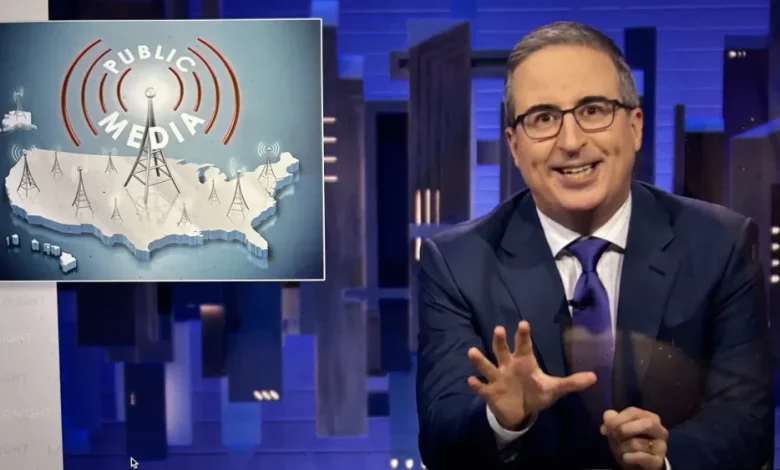John Oliver ‘Last Week Tonight’ Auction to Support Public Broadcasting

John Oliver tackled the Trump Administration’s defunding of public media for his final “Last Week Tonight” episode of 2025, detailing how the decision to eliminate $1.1 billion from the Corporation for Public Broadcasting earlier this year has severely impacted radio and TV stations, particularly in rural areas. So Oliver and “Last Week Tonight” are doing their part to help: The show has launched an auction website, John Oliver’s Junk, where 65 items are currently up for bid — including an original 1987 painting by late PBS icon Bob Ross, “Cabin at Sunset,” which at press time was fetching $51,000.
The idea for the auction actually came from the Bob Ross estate, which recently sold three Ross original paintings at auction to support public broadcasting, raising $662,000.
Oliver announced the “John Oliver’s Junk” auction on Sunday’s show, and said the auction would continue through Nov. 24. “We’ve actually accumulated a bunch of weird artifacts on this show over the years that we could definitely auction off to raise some much needed money,” Oliver said. “I am proud to announce last week tonight’s first ever auction in aid of public media. This is real!”
RELATED: PBS CEO Reveals Plan to Save Stations and Programming After Trump Killed Funding, Admits There’s No ‘White Knight That Will Save Us’
Fans of “Last Week Tonight” will recognize several of the items being auctioned: Among them, Russell Crowe’s jock strap (“worn by Russell Crowe in the major motion picture Cinderella Man and later purchased by ‘Last Week Tonight with John Oliver,’ during season 5 of the show, as part of Crowe’s ‘Art of Divorce; auction in which Crowe sold his personal belongings to pay for his divorce”), and “Mrs. Cabbage Oliver” (“John Oliver’s on-screen wife, married during an on-screen wedding officiated by Steve Buscemi. Part of ‘Last Week Tonight’s’ season 9 segment on AI-generated art in which John marries a cabbage in the studio”).
Also: A large, gold-plated re-creation of President Lyndon B. Johnson’s balls (“Sculpture of President Lyndon B. Johnson’s scrotum, part of the season 12 segment on presidential libraries”), five wax Presidents of the United States, golden Adidas sneakers (“Gold sneakers John Oliver promised to wear in a season 2 episode of ‘Last Week Tonight with John Oliver’ if scandal-ridden FIFA President Sepp Blatter stepped down”).
Among other items: A trip to New York to meet Oliver; “a case of Cabernet SauvignJohn, a wine years in the making by ‘Last Week Tonight with John Oliver,’” and a chance to appear in a photo over Oliver’s shoulder during an episode — along with two VIP tickets to a live taping of the show.
Oliver’s “Community” colleague Joel McHale also appeared in the episode, which featured a flashback to when McHale hosted a pledge drive for Seattle’s PBS station in 1999 — and couldn’t stop talking about “Mr. Bean.” To commemorate that, McHale has signed a DVD set of “Mr. Bean” episodes, which is also being auctioned.
Oliver spent much of Sunday’s episode discussing public broadcasting’s predicament: “Public media has been truly innovative in reaching underserved audiences. It was public TV station that first invented closed captioning in the 1970s. Stations around the country offer programming in Haitian, Creole, Navajo, Vietnamese and many other languages. But as you undoubtedly know, it is now facing a serious threat, as over the summer, Congress decided to eliminate $1.1 billion that have been allocated to fund public broadcasting for the next two years.”
Oliver took on how Republicans have attacked public media since almost the moment that President Johnson first signed the law putting the CPB into existence, and he explained how criticism of a “liberal bias” inside public media is really about something else: “there can be a good faith debate over bias in the media, liberal or otherwise, but I’ll point out that a lot of the time, what conservatives claim as ‘liberal bias’ is often just things like showing there’s a long history of racism in America, or that gay people exist — making it hard to interpret those criticisms as anything other than bigotry. And yet, arguments like those just got used to justify zeroing out the entire budget of the CPB.”
Oliver also noted the irony that by cutting budgets, local stations will now have to rely more on national content coming out of major markets like New York, instead of producing vital local community programming. “The irony is, the more local stations budgets are slashed, the more they may come to rely on programming produced in those urban echo chambers. As the executive director of a station in California said, the local stuff that’s so important to people is probably the stuff that will go away.”
Oliver noted that public radio and TV stations have been behind vital local investigative reporting in areas where there are few other media outlets. And “Last Week Tonight” has relied on public reporting for pieces it has done on subjects such as HOAs, juvenile justice and lethal injection.
“Public Media can be how critical information gets disseminated in communities with limited broadband or cell service,” he said. “Public Radio may be the only way to distribute missing and endangered persons alerts. It can also be crucial during an emergency like a hurricane.
“Frankly, it’s always been a bit weird how little we fund public media, given how vital it can be. Here in the U.S., public media is a global outlier in how little federal funding it receives. Even before these cuts, federal spending amounted to less than $1.60 per capita — compared to countries like Norway, Sweden and the UK, which devote nearly $100 or more,” he added. “And research shows a positive correlation between the strength of public media systems and the health of democracies…. We’d ideally work on a long term fix for the way the CPB is funded. And instead of giving Congress the power to take its money away every two years, we’d institute some kind of tax or licensing fee that could reliably fund it. That is something people have been recommending since the CPB was first created. Sadly, we do not live in that universe right now and until we do, public media is in a dire situation now.”





